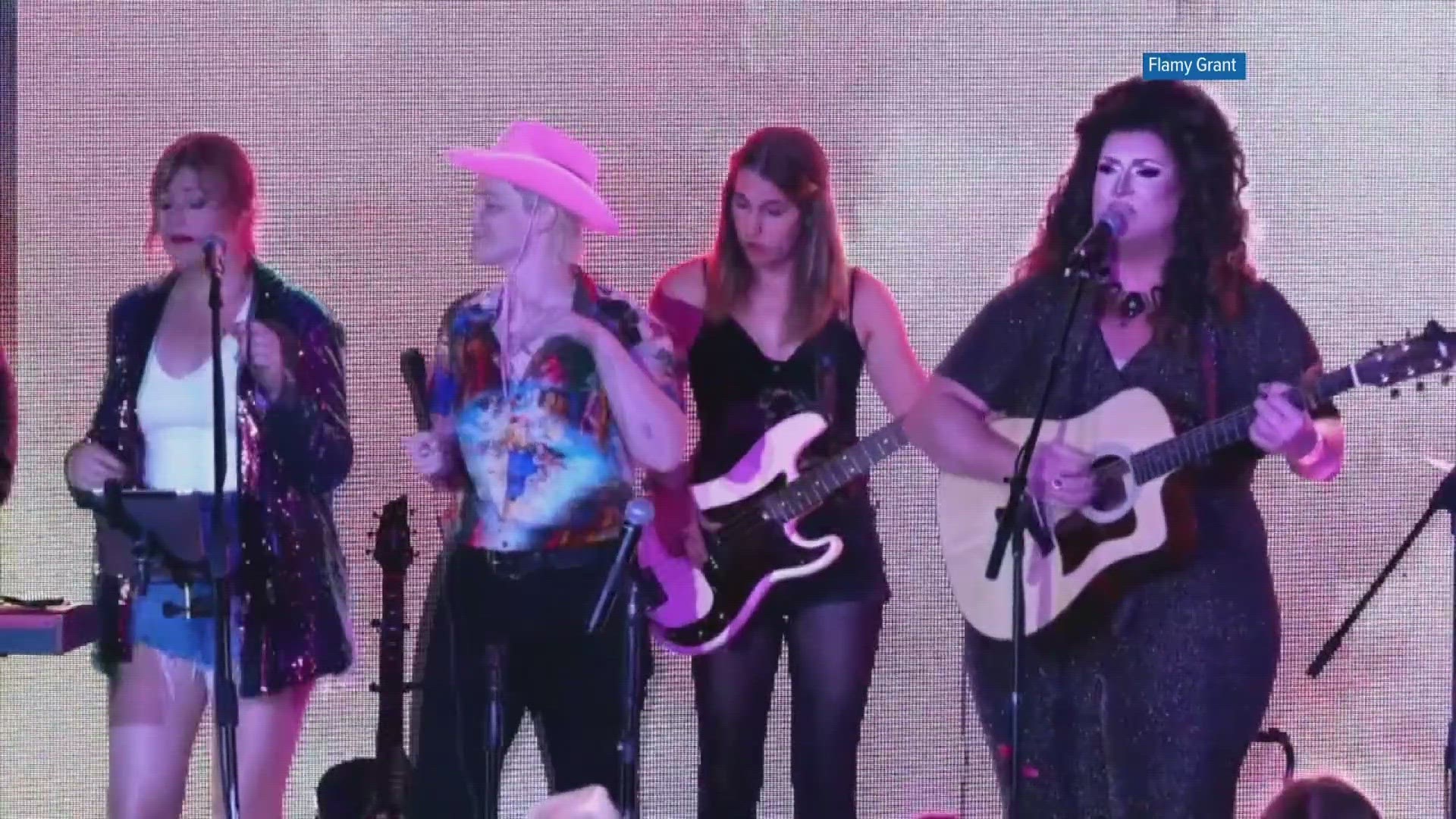BLOUNT COUNTY, Tenn. — Blount Pride is expected to continue as scheduled on Saturday, according to a release from the American Civil Liberties Union of Tennessee.
Ryan Desmond, the Blount County District Attorney General, had previously sent a letter warning his office would prosecute Blount Pride organizers if "adult cabaret" shows are held at the festival, citing an anti-drag law enacted in Tennessee earlier in the year that was later ruled unconstitutional following a lawsuit originally filed in the Memphis area.
On Thursday, the ACLU filed a lawsuit in the Eastern District of Tennessee on behalf of Blount Pride asking the court to issue another temporary restraining order and injunction against the law, this time in the Knoxville-area court. Included in the lawsuit is a drag performer, Flamy Grant, who was going to perform at the event.
Grant's album "Bible Belt Baby" topped the iTunes Christian music charts in late July. According to her website, it's also the world's first contemporary Christian music record by a drag performer.
"Drag is not a new art form; nor is it inherently – or even frequently – indecent," the lawsuit says. "By 1927, drag had become specifically linked with the LGBTQ+ community, and by the 1950s, drag performers began entertaining in bars and spaces that specifically catered to gay people. In the decades that followed, drag solidified itself as an art form."
The lawsuit says Tennessee already has state laws prohibiting obscenity or indecent exposure in front of minors. It also said Blount Pride's promotional materials, including social media posts, were not sexual in nature.
The lawsuit argues Desmond's decision to send the letter to law enforcement officers "empowers and encourages police to enforce the unconstitutional Act."
"This act chills the speech of Plaintiffs and any other person in Blount County who is subject to Defendant Desmond’s jurisdiction. Worse, the letter specifically targets Plaintiffs for enforcement," the lawsuit says.
It also says Desmond had tried to find a way to seek a prior restraint against Blount Pride before sending the letter, which would have prevented them from having the event.
"In other words, he tried to find a way to violate Plaintiffs’ First Amendment rights. When that failed, he opted instead to send a threatening letter to Plaintiffs and the host site of their event," the lawsuit said.
It argues he could have issued a public statement to notify Blount Pride of the law, and instead chose to try intimidating them in an attempt to "chill Plaintiff's speech and expression."
It also said that when Rep. Chris Todd (R - Madison County) sought to cancel a similarly family-friendly drag show organized by Jackson Pride in 2022, he "sought to prevent any drag entertainment, no matter how G-rated, from being performed in front of children, merely because he personally disagrees with the content."
Todd introduced the House version of the bill that later became the state's anti-drag law. After Gov. Bill Lee signed the law in March 2023, a drag-centric theatre company in the Shelby County area filed a lawsuit alleging it was unconstitutional. In that lawsuit, the company sought relief against Shelby County District Attorney General Steve Mulroy.
In that lawsuit, a federal judge agreed and ruled to bar the attorney general there from enforcing it.
"This statute-- which is barely two pages long-- reeks with constitutional maladies of vagueness and overbreadth fatal to statutes that regulate First Amendment rights," Judge Parker wrote in the Shelby County lawsuit decision.
That lawsuit in Memphis made similar arguments seen in the Blount Pride lawsuit regarding Jackson Pride and the prevalence of drag art.
Both lawsuits also warned that the threat of felony charges from the anti-drag law also had a "chilling effect" across Tennessee, particularly against the LGBTQ+ community. They also argue that the law's vagueness created uncertainty for artists, who could face felony charges for accidentally violating it.
"There is no way for a citizen of Tennessee to be on notice for what conduct could violate this law – and possibly subject them to felony charges," the lawsuits say.
It also says the Memphis-area lawsuit was appealed by the District Attorney there to the Sixth Circuit. If ruled unconstitutional there, it would be unconstitutional outright across Tennessee.
"We are concerned about how the current circumstances will affect Saturday’s Pride. However, at this time, we are planning to proceed with Blount Pride as scheduled. We encourage families to attend and celebrate with us as they are able. Should anything change regarding our plans, we will post this information to our website and social media," Blount Pride said in a statement.

